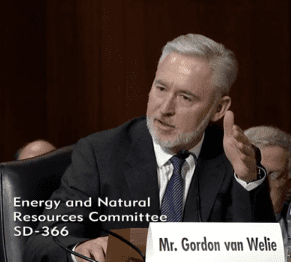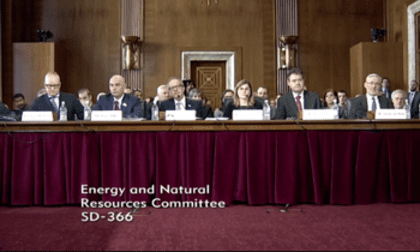ISO-NE CEO testifies before Senate Energy Committee; highlights cold weather operations and ISO’s Operational Fuel Security Analysis
On January 23, ISO New England President & CEO Gordon van Welie testified before the Senate Committee on Energy & Natural Resources (ENR) to discuss bulk power system operations during the recent cold weather period and the ISO’s Operational Fuel-Security Analysis.

van Welie began by noting that during an earlier appearance before the Committee in 2013 that he stressed the need for New England to address growing fuel-security challenges. On January 23, van Welie stated that “we’ve known for several years that when it gets cold New England does not have sufficient natural gas supply infrastructure to meet demand for both home heating and power generation.” He highlighted that while the electric grid operated reliably during the cold snap in late December/early January, that the reliability, economic, and environmental impacts are significant when oil- and coal-fired units are dispatched in response to high natural gas prices or natural gas scarcity. Van Welie warned that the winter is not over and that the ISO will be closely monitoring both fuel inventories and emissions limits for generators as the winter continues.

van Welie also outlined the results of (and impetus for) the ISO’s Operational Fuel Security Analysis. In particular, he stressed that the results of the Analysis indicate the possibility of substantial amounts of emergency operations (including load-shedding) under the majority of the scenarios studied. He acknowledged that there will be a cost to the investments needed to meet these fuel-security challenges, but that the alternative “is negative impacts on system reliability, chronic price spikes during cold weather, higher emissions when it’s more economic to burn oil than natural gas, and the possibility of further interventions by ISO-NE in the wholesale electricity market to try to delay critical resources from retiring.”
He closed his formal testimony by noting that “we now face challenges that do not lend themselves to easy solutions. As we have seen recently, the fuel-security difficulties are real and they are significant. Until they are addressed, cold weather will continue to drive substantial increases in the price of natural gas (as well as wholesale energy) and emissions and create regional reliability challenges.”
During the Q&A, van Welie was asked about the role that oil- and coal-fired and nuclear resources played during the recent cold weather and their importance to grid reliability during high demand periods. Maine Senator Angus King discussed with van Welie the impact of constraints on the natural gas pipelines coming into New England. And van Welie noted the issues surrounding the importation of foreign liquefied natural gas while gas produced in the US is being sold overseas.
For additional information on the hearing, please visit the ENR website.
- Categories
- Events
- Tags
- energy adequacy, ISO leadership
